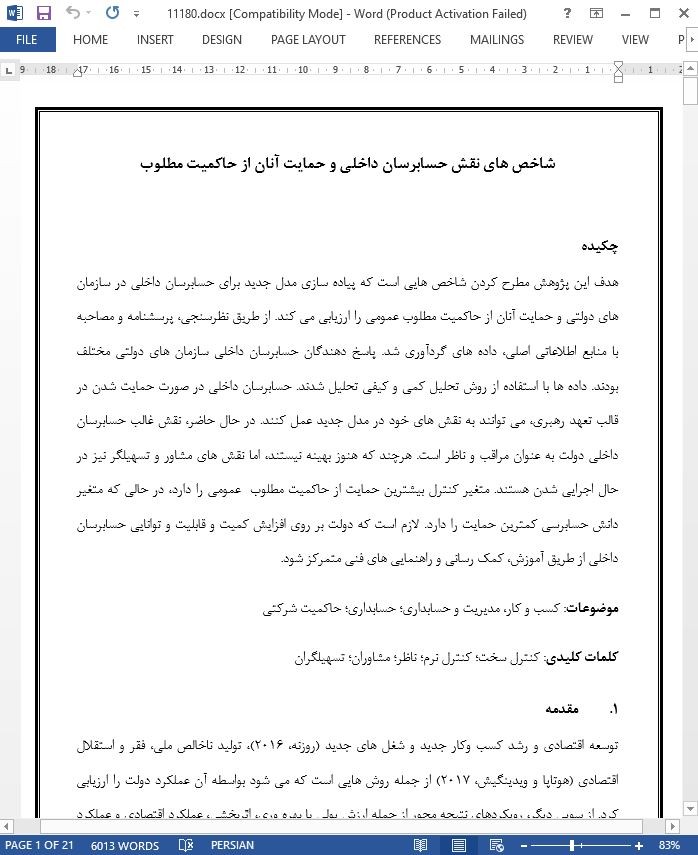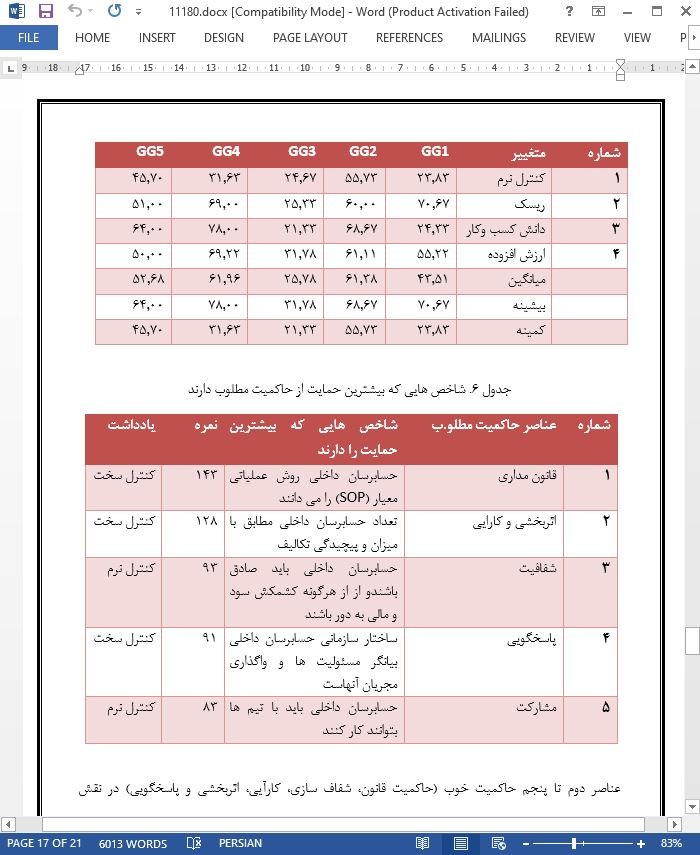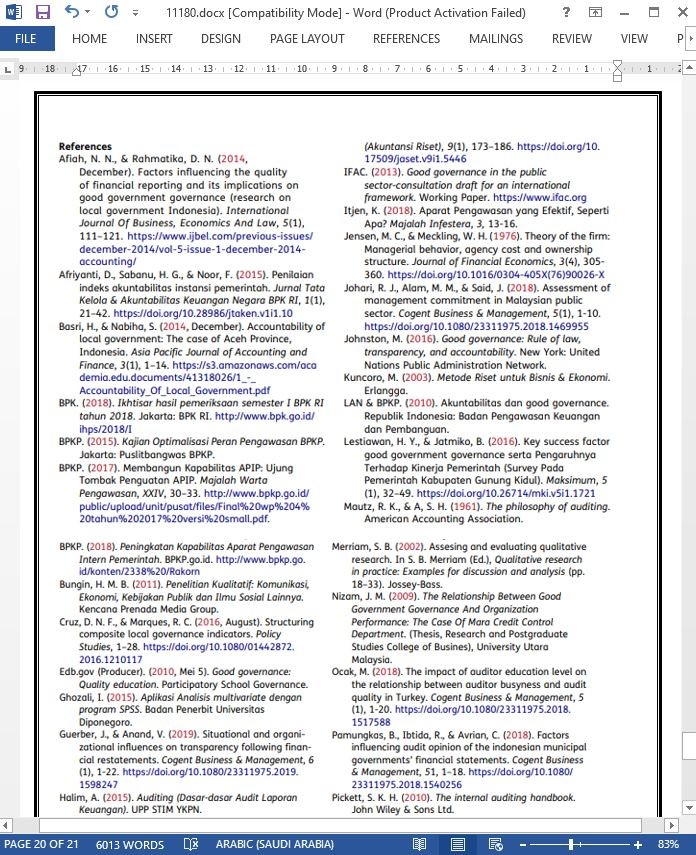
شاخص های نقش حسابرسان داخلی و حمایت آنان از حاکمیت مطلوب
چکیده
هدف این پژوهش مطرح کردن شاخص هایی است که پیاده سازی مدل جدید برای حسابرسان داخلی در سازمان های دولتی و حمایت آنان از حاکمیت مطلوب عمومی را ارزیابی می کند. از طریق نظرسنجی، پرسشنامه و مصاحبه با منابع اطلاعاتی اصلی، داده های گردآوری شد. پاسخ دهندگان حسابرسان داخلی سازمان های دولتی مختلف بودند. داده ها با استفاده از روش تحليل كمي و كيفي تحليل شدند. حسابرسان داخلی در صورت حمایت شدن در قالب تعهد رهبری، می توانند به نقش های خود در مدل جدید عمل کنند. در حال حاضر، نقش غالب حسابرسان داخلی دولت به عنوان مراقب و ناظر است. هرچند که هنوز بهینه نیستند، اما نقش های مشاور و تسهیلگر نیز در حال اجرایی شدن هستند. متغیر کنترل بیشترین حمایت از حاکمیت مطلوب عمومی را دارد، در حالی که متغیر دانش حسابرسی کمترین حمایت را دارد. لازم است که دولت بر روی افزایش کمیت و قابلیت و توانایی حسابرسان داخلی از طریق آموزش، کمک رسانی و راهنمایی های فنی متمرکز شود.
1. مقدمه
توسعه اقتصادی و رشد کسب وکار جدید و شغل های جدید (روزنه، 2016)، تولید ناخالص ملی، فقر و استقلال اقتصادی (هوتاپا و ویدینگیش، 2017) از جمله روش هایی است که می شود بواسطه آن عملکرد دولت را ارزیابی کرد. از سویی دیگر، رویکردهای نتیجه محور از جمله ارزش پولی یا بهره وری، اثربخشی، عملکرد اقتصادی و عملکرد مالی نیز می توان به کار گرفت (بصری و نابیها، 2014؛ سوتوپو و همکاران، 2017). اگر دولت به درستی حاکمیت را اجرا کند، عملکرد بهبود می یابد. عوامل بسیاری برای ارزیابی عملکرد دولت داخلی استفاده می شود که یکی از آنها حاکمیت دولتی خوب است (هوتاپا و ویدینگیش، 2017). نیزم (2009) اظهار داشت که حاکمیت خوب بخش دولتی در مجموع تاثیر چشمگیری بر عملکرد بخش دولتی دارد.
5- نتیجه گیری
نتایج ذیل از یافته های این مقاله اتخاذ شده است. پیاده سازی بهینه نقش حسابرسان داخلی مستلزم حمایت و متعهد بودن رهبران است. این ملزومات می تواند در قالب دادن اختیاراتی به حسابرس برای انجام کار مستقل و بهبود شایستگی او باشد. نقش حسابرسان داخلی دولت در حال تغییر و شیفت به نقش یک مشاوره و سازمان دهنده تشکیلات است، اگرچه نقش آنها به عنوان ناظر برجسته تر است. حسابرسان داخلی بایداین استقلال را خود مطابق با مدل جدید در انجام نقش های حفظ کنند. در نهایت، باید اعتماد و شفافیت بین حسابرسان و حسابرسی شونده برای افزایش اثربخشی نقش حسابرسان داخلی به عنوان مشاور، بهبود یابد.
Abstract
The study aimed to develop indicators to measure the implementation of a new model for internal auditors in government organizations and their support of good public governance. Data was collected through a survey, with questionnaires, and interviews with key informants. Respondents were internal auditors from various government organizations. Data were analyzed using both quantitative and qualitative analysis. Internal auditors can carry out roles under a new model if they receive support in the form of leadership commitment. Currently, the dominant role of government internal auditors is as a watchdog. Roles as consultants and catalysts have begun to be implemented, although they are not yet optimal. The control variable provided the highest support for good public governance, while the audit knowledge variable provided the lowest support. The government needs to focus on increasing the quantity and capability of internal auditors through training, outreach, and technical guidance.
1. Introduction
Government performance can be measured in various ways, including economic development and the growth of new businesses and new jobs (Ruzzene, 2016), GDP, poverty, and economic independence (Hutapea & Widyaningsih, 2017). Alternatively, outcome-oriented approaches can also be used, such as value for money or efficiency, effectiveness, economic performance, and financial performance (Basri & Nabiha, 2014; Sutopo et al., 2017). The performance will improve if the government implements good governance. Many factors can be used to measure local government performance, one of which is good government governance (Hutapea & Widyaningsih, 2017). Nizam (2009) stated that good public sector governance as a whole has a significant effect on public sector performance.
5. Conclusion
The following conclusions were drawn from the results of this study. The optimal implementation of the role of internal auditors requires the support and commitment of leaders, which could be in the form of giving authority to carry out tasks independently and improve auditor competency. The role of government internal auditors has begun to change into being a consultant and catalyst, although their role as watchdogs is more dominant. Internal auditors must maintain independence in carrying out their roles in line with the new model. Finally, trust and openness between auditors and auditees need to beimproved to increase the effectiveness of the role of internal auditors as consultants.
چکیده
1. مقدمه
2. چارچوب نظری در مورد نقش حسابرسان داخلی
3. روش های تحقیق
4. نتیجه گیری و بحث
4.1. شاخص های برنامه مدل جدید برای نقش حسابرس داخلی دولت
4.2- پیاده سازی مدل جدید در نقش حسابرسان داخلی دولت
4.3. نقش حسابرسان داخلی دولت در حمایت از حاکمیت عمومی خوب
5- نتیجه گیری
Abstract
1. Introduction
2. Theoretical framework for internal auditors role
3. Research methods
4. Results and discussion
4.1. Indicators of the new model application for the role of government internal auditor
4.2. The implementation of the new model to the role of government internal auditors
4.3. The role of government internal auditors in supporting good public governance
5. Conclusion
- اصل مقاله انگلیسی با فرمت ورد (word) با قابلیت ویرایش
- ترجمه فارسی مقاله با فرمت ورد (word) با قابلیت ویرایش، بدون آرم سایت ای ترجمه
- ترجمه فارسی مقاله با فرمت pdf، بدون آرم سایت ای ترجمه



